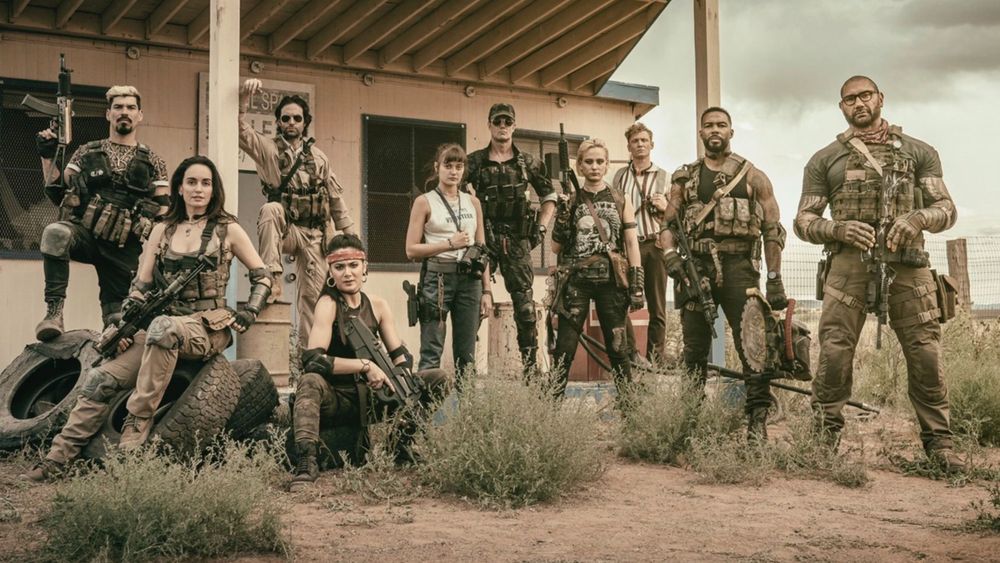Little was known about the plucky young filmmakers James Gunn and Zack Snyder when their names were both splattered across the credits of 2004’s remake of George A. Romero’s satirical horror classic Dawn of the Dead. Going on to helm the wildly popular Guardians of the Galaxy and Justice League series respectively, they are now known as the pioneers of modern-day commercial filmmaking stuffed with bombastic violence and smart-aleck comedy. Part of both the Marvel and DC ‘cinematic universe’, this term has become ubiquitous with contemporary filmmaking, defining a series of successful films that each tie into each other as well as a wider network of extra content. Clearly, Netflix has demanded a similar lineage for Zack Snyder’s latest zombie outing, Army of the Dead, a film feeling closer to the cinematic introduction of a video game than a complete, satisfying feature film.
Though this criticism shouldn’t come as a surprise to Zack Snyder who was similarly picked apart by George A. Romero in 2005, commenting that Snyder’s remake of Dawn of the Dead “lost its reason for being. It was more of a video game…There was nothing going on underneath”. With constant hordes of enemies characterised by distinctly different abilities, Snyder’s Army of the Dead suffers from very similar problems, becoming a mere neon zombie shoot ’em up laden with pointless ‘easter eggs’ winking towards a wider cinematic world.
It all breeds from a concept which at its core is intriguing. Where zombie thrillers are usually throwaway survival stories in order to service 90 minutes of pulpy violence, Snyder’s script, which has been in development for over 10 years, questions what society might look like after such a pandemic is contained. The zombie apocalypse is in fact quarantined within the shipping-container walls of central Las Vegas, a land now dusted with debris and home to a strange tribe of fantastical zombies. Though, of course, the money beneath the casino’s remains abandoned, leaving Scott Ward (Dave Bautista), and his band of outlandish characters to recover the stacks of green bills.
Intriguing as it may be, Snyder’s creation, a self-confessed amalgamation of both Escape from New York and Planet of the Apes, becomes strangely dull once the characters take their first steps in the zombie-infested land of Las Vegas. It certainly doesn’t help that the crew, slapped together by Bautista’s Scott Ward, is given such little time to breathe before they’re thrown into the onslaught. Tig Notaro’s maverick pilot Marianne Peters, and Matthias Schweighöfer’s strange safe-cracking German stereotype ‘Dieter’ come off as the jewels in the group’s crown, providing some much-needed vigorous character to the otherwise barren leading cast.
Despite its vibrant environment, the film focuses largely on just two locations, a sparkling casino complex where the group venture, and a hotel named ‘the Olympus’ where the zombies reside (and seemingly hold meetings?). Wondering these dull corridors and beige outdoor environments, the potential of the story’s playground is literally walked on by, leaving instead an uninspired vision copy and pasted from Hollywood’s dullest post-apocalyptic flicks. From a director who boasts such a vivid cinematic style, it’s certainly strange that Snyder bypassed the chance to create a truly unique, dynamic zombie thriller, opting instead for something that more closely resembles a commercial pilot episode for an upcoming series.
Lightly brushing over the surface of its potential, Zach Snyder’s film is a transparent business proposition in which story points are left purposefully vague in order to elaborate at a more convenient time. Without the human weight of his previous monstrous movie, Dawn of the Dead, here there’s little to chew on besides the empty joys of pulpy violence. This star-studded trip into Sin City is less sinful and more plain silly.
